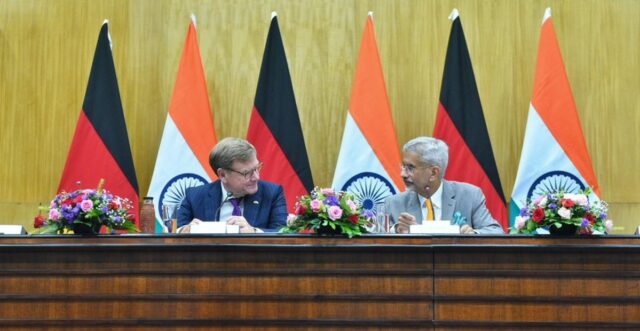
With Trump tariffs hitting exports, India is keen on an early trade deal with the European Union (EU). And it’s been assured of full help from Germany, Europe’s biggest economy. “We believe it is time for the India-EU FTA negotiations to move to a decisive conclusion,” Jaishankar stated, after holding talks with his German counterpart Johann Wadephul. “We appreciate Minister Wadephul’s assurance that Germany will bring its full weight behind the process.”
The next round of negotiations is expected soon. Both sides are reportedly working to resolve differences in market access, intellectual property and regulatory standards, particularly in agriculture, dairy and digital trade.
Jaishankar pointed to contemporary global challenges of economic volatility and political uncertainty. “We believe that a multipolar world with strategic autonomy can best respond through more intensive consultations and cooperation,” he told journalists in New Delhi.
Haling India-German relationship as very steady, Jaishankar called it a need in times of uncertainty. “It is a relationship where largely what we promise to each other and policies that we have remain constant and predictable. So predictability today has a huge premium in global politics.”
Technology And Trade
With about €50 billion of bilateral trade last year, India and Germany are keen on diversifying their economic partnership. Germany’s push to reduce dependence on China has opened doors for enhanced cooperation with India in critical technologies.
A major highlight from the talks was Germany’s growing interest in India’s semiconductor ecosystem. “Semiconductors are a future-critical sector, and we welcome Germany’s willingness to engage with India in this space,” Jaishankar said.
Wadephul, who visited Bengaluru ahead of the talks, praised India as a “technology powerhouse” and pointed to upcoming partnerships between German firms like Siemens and Indian research institutions. New academic and industrial collaborations, including prospective linkages with IIT Madras, are expected to form part of this new tech alliance.
Green Hydrogen
The two sides also discussed joint efforts on climate action, with focus on green hydrogen. “Germany’s expertise in clean energy and India’s renewable capacity create a natural synergy,” Jaishankar noted. “Green hydrogen cooperation is an area with real potential, and we look forward to developing concrete projects together.”
Security And Counter-Terrorism
Security cooperation also featured prominently in the talks, particularly in the context of Operation Sindoor, India’s strikes on terror targets in Pakistan. Germany’s open support for India’s right to defend itself against terrorism was acknowledged.
Germany had earlier condemned the April 2025 Pahalgam terror attack, which claimed 26 lives, and reaffirmed its commitment to global counter-terrorism frameworks.
“Germany’s strong and clear stance on terrorism aligns with our own zero-tolerance approach,” Jaishankar said.
Both leaders agreed that global terrorism remains a pressing threat and called for greater intelligence sharing, law enforcement cooperation, and multilateral action against state-sponsored extremism.
From Bilateral to Multilateral
The visit marks the first official trip to India by Johann Wadephul as German Foreign Minister, following Jaishankar’s visit to Berlin in May. The timing, coinciding with 25 years of Indo-German strategic partnership, was underscored by both ministers.
Wadephul brought along a high-level business delegation and members of the German Bundestag, reflecting Berlin’s political and commercial commitment to India as a strategic partner in the Indo-Pacific.




